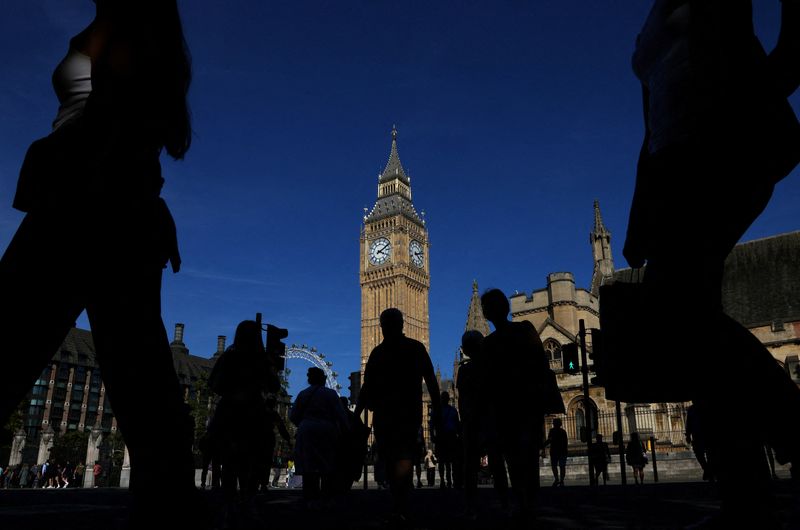UK wage growth cools slightly but stays close to record
2023.11.14 03:32

© Reuters. FILE PHOTO: People are silhouetted as they walk near the Elizabeth Tower, more commonly known as Big Ben, and the Houses of Parliament in London, Britain, September 14, 2023. REUTERS/Toby Melville/File Photo
By William Schomberg and David Milliken
LONDON (Reuters) -British wages grew slightly less fast in the three months to September but remained close to their record pace, according to official data that will do little to ease the Bank of England’s concerns about inflation pressures.
Earnings excluding bonuses were 7.7% higher than a year earlier in the third quarter, the figures from the Office for National Statistics (ONS) showed on Tuesday.
Economists polled by Reuters had forecast a 7.7% rise.
The figure represented a slight slowdown in regular pay growth from 7.9% in the previous two ONS reports, the highest since the data collection began in 2001.
“The labour market remains very tight and businesses are still struggling to hire the people they need,” Alexandra Hall-Chen, a policy advisor at the Institute of Directors, said.
The BoE is watching pay growth as it assesses how much inflation pressure remains in Britain’s economy after it raised interest rates 14 times in a row between December 2021 and August this year, since when it has kept rates on hold.
Including bonuses, which are typically volatile, pay growth slowed to 7.9% from 8.2% in the three months to August.
The BoE has said pay growth is dropping too slowly for it to consider cutting interest rates although the central bank has said unofficial estimates of wage increases suggest a less steep climb than the numbers from the Office for National Statistics.
Sterling rose against the U.S. dollar after the ONS released its figures.
Some other measures of Britain’s jobs market have suggested a cooling of the inflationary heat in recent months and Tuesday’s data showed a fall in vacancies to their lowest level since the April-to-June period in 2021.
Britain’s unemployment rate held at 4.2%, according to experimental figures the ONS is using to offset a drop in response rates to its usual Labour Force Survey of households which seeks to measure changes in employment and unemployment.
Employment rose by 54,000 in the three months to September. The economists polled by Reuters had expected a sharp fall.
“While there is some uncertainty around the accuracy of this data release, other indicators also suggest the labour market is gradually cooling, not collapsing,” Jake Finney, an economist at PwC UK, said.
Finance minister Jeremy Hunt welcomed an increase in wages when adjusted for inflation which has fallen from its high of more than 11% just over a year ago and is expected to dip under 5% in data due to be published on Wednesday.
Hunt said his Nov. 22 update on the budget and economic count would include “plans to get people back into work and deliver growth for the UK.”








